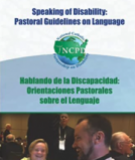
Speaking of Disability: Pastoral Guidelines on Language
This is a bilingual publication (English and Spanish).Despite their usefulness and indispensability for most people, written and spoken languages have undeniable limitations and evolve over time. These limitations are perhaps nowhere more evident than in discussing what are commonly called disabilities. This word itself, insofar as it focuses on what a person might not be able to do — thereby perhaps obscuring recognition of that person’s capabilities and gifts — exemplifies the limitations of language in this realm of human experience.However, we must not allow the difficulty of conversation regarding disability to deter us from undertaking it. On the contrary, it highlights the need to develop and exercise our ability to do so in a manner that fully respects the dignity of the human person living with what — for lack of a better word — we currently call disability. This document is humbly intended as a small step in the direction of such responsible, respectful discourse.
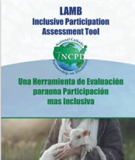
LAMB: Inclusive Participation Assessment Tool: Language, Accessibility, Meaningful Participation, Belonging
This is a bilingual publication (English and Spanish).We are called to follow the Lamb of God, Jesus Christ, reaching out so that all feel welcomed, valued and affirmed. Expertise is not needed. All that is necessary is the will to meet each person, get to know him or her, and form a relationship. To do this it is important to consider various forms of communication, various ways of moving in spaces, various ways of participating, and various ways to nurture an environment of belonging. Four attributes of thriving communities that foster spiritual growth for all are Language, Accessibility, Meaningful Participation,and Belonging (LAMB). The NCPD Council on Intellectual and Developmental Disabilities (CIDD) offers the LAMB Assessment Tool to support this vision by guiding the development and evaluation of programs, materials and/or other resources for use in the Church, relative to accessibility or usability for all persons.
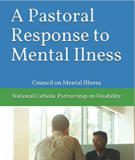
A Pastoral Response to Mental Illness
This is a bilingual publication. Leaders of a parish, diocese, or other Catholic organizations can learn the signs of mental illness and reach out to those living with the illness. One in four families will at some time have to cope with mental illness and its effects on a loved one and the family unit. The stigma attached to mental illness forces many to hide the severity of their symptoms or those of a loved one. Many stop coming to church due to the stigma. People can and do recover from mental illness. Recovery can be thought of as a table with four legs. All four legs must be whole, strong, and firmly attached for recovery to take hold. This depends on access to help that includes the four legs of recovery. This booklet identifies the four legs of recovery, where to find the resources for those legs, and when and where to reach out for more help.
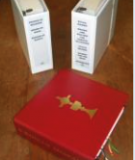
Large Print Roman Missal
Through an agreement with the USCCB, the National Catholic Partnership on Disability will be able to offer large print formats of the Roman Missal, Third Edition to priests and deacons. We do not charge for the item but will send a recommended donation request along with the shipment.
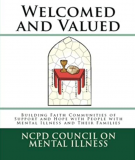
Welcomed and Valued
This 95-page resource contains information on raising awareness of the issues with mental illness and offers resources for building faith communities of support and hope with persons with mental illness and their families.
People who experience major mental illnesses tend to feel isolated and marginalized. They often feel excluded from the community in which they grew up and from their own parish. The myths about and the misunderstanding of mental illness keep some people and their families from participating in the life of the church because they feel judged, devalued, unwelcome, or different. Awareness of these perceptions, which are often overlooked or discounted, can guide parishes in the most helpful response. Including people with mental illness and their families in addressing these issues will provide insights into the most effective response.
